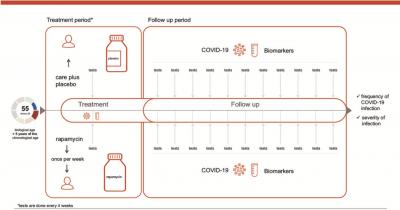Clinical trial to explore the potential of rapalogs to enhance resilience against SARS-CoV-2 infection and reduce the severity of COVID-19 in biologically aged individuals.

Credit: Deep Longevity Limited
10th of February, Wednesday, Hong Kong – Deep Longevity, a fully-owned subsidiary of Regent Pacific (SEHK:0575.HK), specializing in the development and the application of next-generation artificial intelligence (AI) for aging and longevity research, today announced the publication of an article in Lancet Healthy Longevity titled “The potential of rapalogs to enhance resilience against SARS-CoV-2 infection and reduce the severity of COVID-19”.
While the pandemic continues to unfold, targeted therapeutic solutions for COVID-19 are still not established. The extremely rapid development of various vaccines as a preventative approach provides reassurance, but at the same time faces a number of major challenges: insufficient protection against mutated variants, production line limitations, anti-vaccination skeptics etc. At the same time, COVID-19 still disproportionately affects older and comorbid individuals, who mostly suffer from more severe courses of illness, complications and lethal outcomes. Most frequently, advanced age goes hand in hand with comorbidities, which potentiates the adverse effect of the virus drastically.
Vaccines are still far from arriving at a complete protection. Unfortunately, the population least likely to benefit from such solutions are also those at the highest risk: the elderly and individuals with pre-existing age-related conditions. “It is a double-edged sword: the immune system of elderly and multimorbid (any age) patients is compromised. Those individuals are thus more prone to get infected and to develop a more severe disease. On the other hand, their response to a vaccine – which acts on and with the immune system – might be insufficient. We also see reinfections occurring in elderly patients, which then take an even more aggressive course, leading to fatalities.” said associate prof. Evelyne Bischof, Harvard, Columbia and Basel trained MD, practicing physician, one of the authors of the paper in Lancet Healthy Longevity today – a joint work of the world-renowned biogerontologists and longevity specialists prof. Alex Zhavoronkov, prof.Matt Kaeberlein, and prof. Richard Siow. ‘It is a major problem not only because of the predominantly aged demographics, increased danger in care homes for elderly, but especially because most elderly patients are also comorbid – due to the aging processes causing age-related, mostly chronic diseases.” She continues. Such patients are at a significantly enhanced risk of infection and death if they need to be hospitalized for non-COVID-19 reasons.
While most trials exclusively target the infectious component of the disease, the authors outline the rationale behind a double approach: targeting COVID in the biologically aged for better prevention, vaccination efficacy and improved outcomes. The reasoning is complex and interrelated: old age is related with immunosenescence (immune system aging and thus worse function), with age-related diseases that are related with more severe COVID-19 course, e.g. diabetes, hypertension, cancer etc., with frailty and vulnerability (more exposure, e.g. due to homecare or institutionalization). Therefore, in order to efficiently intervene, geroprotective and senoremediative interventions towards mounting the immune response to vaccines are of uttermost importance, both from the medical, as well as the global economic aspect.
AI-based strategies were harnessed for repurposing known geroprotectors such as rapamycin, for the prevention of SARS-CoV-2 infection. Pre-clinical simulation analysis and previous evidence showing paradoxical immunopotentiation effects of rapamycin urge to propose additional clinical trials for these molecules in the broad elderly population.
In addition, in contrast to current studies, the authors propose to use an objective measurement of the biological rather than the chronological age. In the absence of reliable predictive and prognostic COVID19-biomarkers, minimally-invasive deep aging clocks are suggested as surrogate markers of biological age to track the efficacy of these preventative geroprotective interventions and to stratify the patients by predicted severity of the disease. Moreover, it will allow validation of markers of biological age in the context of viral infections and identification mechanisms by which geroprotectors enhance resilience against infections and reduce the severity of symptoms. This AI based approach in precision medicine was just recently illustrated in Nature Aging
The Lancet Healthy Longevity paper outlined the available evidence and a clinical translation of the geroprotector rapamycin for further research in a clinical trial setting, paving a new perspective: longevity medicine in pandemics. Longevity medicine as AI-based precision medicine aims to assure a healthy lifespan, mitigating and eliminating the risks and development of age-related diseases. Different from the reactive medicine, it uses the latest anticipatory technologies and muti-omics technologies to delay, attenuate or reverse senescence on all levels (cellular, tissue, system, organism, society). The benefits of such an approach in this and future pandemics is obvious, while the publication pioneers the scientific base for a longevity medicine RCT using geroprotective interventions.
###
About Deep Longevity:
Originally incubated by Insilico Medicine, Deep Longevity was acquired on 14 December 2020 by Regent Pacific Group Limited (SEHK:0575.HK), a specialist healthcare, wellness and life sciences investment group. Deep Longevity is developing explainable artificial intelligence systems to track the rate of aging at the molecular, cellular, tissue, organ, system, physiological, and psychological levels. It is also developing systems for the emerging field of longevity medicine, enabling physicians to make better decisions on the interventions that may slow down or reverse the aging processes. Deep Longevity developed the Longevity as a Service (LaaS) solution to integrate multiple deep biomarkers of aging dubbed “deep aging clocks” to provide a universal multifactorial measure of human biological age.
https:/
About Regent Pacific (SEHK:0575.HK)
Regent Pacific is a diversified investment group based in Hong Kong currently holding various corporate and strategic investments focusing on the healthcare, wellness, and life sciences sectors. The Group has a strong track record of investments and has returned approximately US$298 million to shareholders in the 21 years of financial reporting since its initial public offering.
https:/
Media Contact
Klugh Cliff
[email protected]
Related Journal Article
http://dx.




